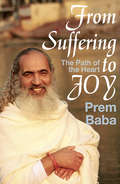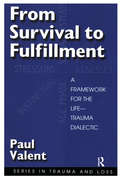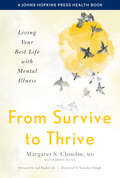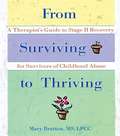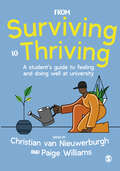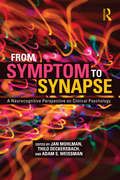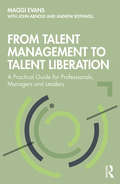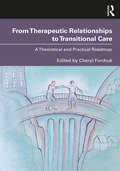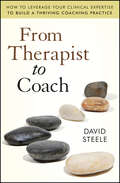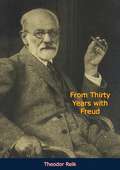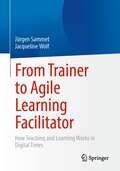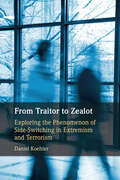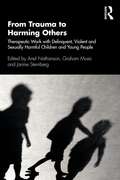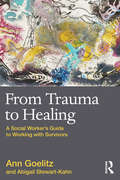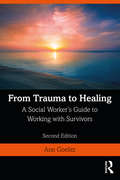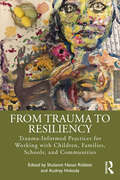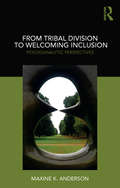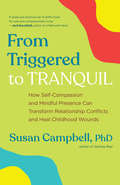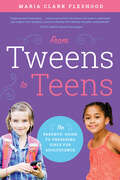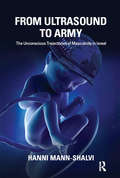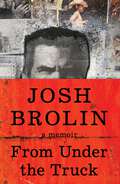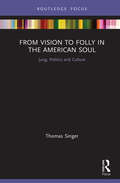- Table View
- List View
From Suffering to Joy
by Prem BabaFrom Suffering to Joy offers a method of self-discovery that can help bring harmony to your life and help you build truly intimate relationships. Prem Baba is a Brazilian master teacher of an ancient spiritual lineage in India who focuses on building a bridge between spirituality and psychology, East and West. In this book he offers a practical methodology called the Path of the Heart, which can help you learn to: Overcome limiting psychological patterns by recognizing and working with your inner child Take responsibility for and transform the negative conditioning that causes suffering to you and those around you Awaken your higher consciousness through daily practices of meditation and prayer Contribute to resolving global problems through changes in your life By following the Path of the Heart, you will be able to move beyond the limitations of the ego and know the love and joy that are your essence.
From Survival to Fulfilment: A Framework for Traumatology (Series in Trauma and Loss)
by Paul ValentFirst published in 1998. Paul Valent sees that the dialectic is not between "life and death" but between "life and trauma". This text theorizes that the big issues of life can now be approached through the science of traumatology. Through communication with, and observation of, people whose lives have been stretched under stress or disrupted by trauma, the fulfilling components of their lives can be defined, oriented and categorized. It introduces the theory on the back of clinical and historical material, examining the current state of such concepts as stress, trauma, defences, memories, post post-traumatic stress disorder, and other illnesses. It should be of interest to those in the healing professions or to those who work with traumatized individuals, lawyers, social workers, clergy and those in the humanities in general.
From Survive to Thrive: Living Your Best Life with Mental Illness (A Johns Hopkins Press Health Book)
by Margaret S. ChisolmWhat's holding you back? Learn how to take the steps needed to get to a place where you are happier, more productive, and more at peace.Are you struggling with personal problems, a mental health condition, or addiction? Are you looking to permanently improve your well-being and happiness? If you'd like to lead a fuller, more satisfying life—or help a mentally ill loved one—this book is for you. In From Survive to Thrive, Dr. Margaret S. Chisolm, a psychiatrist at the Johns Hopkins School of Medicine, describes a tried-and-true plan to help anyone grappling with life's challenges learn how to flourish. Dr. Chisolm does not define health as the mere absence of illness. She wants you to be able to lead the best life possible—to thrive! In down-to-earth prose, Dr. Chisolm provides insight into how readers can cultivate healthy habits and more positive reactions to life's provocations, choosing not to allow past life circumstances or a disease state to define their well-being. She also• introduces the four perspectives through which all mental distress should be examined: disease, dimensional, behavior, and life story• describes the four pathways associated with well-being: family, work, education, and community• includes fascinating stories from her own clinical (and personal) experience featuring real people who found fulfillment by embracing these perspectives and pathways • supplements detailed, step-by-step advice with interactive elements, including self-assessments and self-reflection exercises• incorporates graphic elements to illustrate important lessons This upbeat guide is the first to detail evidence-based principles for improving well-being in those with mental illness.
From Surviving to Thriving: A Therapist's Guide to Stage II Recovery for Survivors of Childhood Abuse
by Mary BrattonBecome more effective in therapy when working with survivors of abuse! From Surviving to Thriving: A Therapist&’s Guide to Stage II Recovery for Survivors of Childhood Sexual Abuse is a comprehensive manual for treating survivors of childhood physical, sexual, and emotional abuse. Inspired by the author&’s own private practice, it combines both theory and practice and supports the therapeutic partnership with a step-by-step outline of the healing process. This outline includes concrete and incremental strategies and exercises that help you move the survivor beyond Stage I trauma debriefing to life-changing Stage II recovery. In From Surviving to Thriving, you&’ll find everything you need to know about obtaining and maintaining autonomy and speeding recovery in the age of managed care. The self-contained, focused, and incremental interventions presented in this book can be woven into your own therapeutic style, giving you and your clients more freedom, satisfaction, and, most importantly, swift treatment and recovery. You&’ll also find step-by-step guidance for dealing with adult survivors, including rationale for diagnosis, process, and sequence. In addition to the description of theoretical orientations and illustrations, Surviving to Thriving contains: an overview and detailed outline of the incremental recovery process pitfalls and positive strategies for establishing the therapeutic relationship detailed instructions for building a foundation for effective therapy by reframing the client&’s self-concept explanations of pathological symptoms in context of necessary and "brilliant" survival defenses workable, specific, and sequential interventions for each stage of healing designed to become autonomous and self-generating for the client techniques for trauma resolution using the survivor&’s internal experience Because it&’s written in accessible language and includes explanations of clinical concepts, you&’ll feel comfortable putting From Surviving to Thriving in the hands of select clients-a unique feature that sets it apart from most clinical texts. This book provides exercises to help move clients into the healing recovery of Stage II. Enhanced with art and writing from recovering survivors, this book is a valuable asset as you and your clients begin the collaborative journey toward renewed emotional well-being.
From Surviving to Thriving: A student’s guide to feeling and doing well at university
by Christian Van Nieuwerburgh Paige WilliamsMany universities around the world are seeing how they can use theories of positive psychology to help students cope well with the ever-increasing stresses of modern-day life and university. This practical, hands-on book will help you understand, experience and put into practice skills and strategies to improve and sustain your wellbeing so that you can thrive throughout your time at university. With enough scientific theory and knowledge for you to understand why it works, our focus is on practical activities that will make a difference in your life. Edited and authored by practising university teachers of the science of wellbeing, this textbook is essential reading for any student, whether you are studying positive psychology or just navigating university life. Each chapter explores a key area of positive psychology and provides activities to enhance your wellbeing and contribute to that of other people. Covering topics from identifying your strengths to mindfulness, and from dealing with adversity to the importance of play, this book will help you move from surviving to thriving at university. Christian van Nieuwerburgh is Professor of Coaching and Positive Psychology at the Centre for Positive Psychology and Health at the Royal College of Surgeons, Ireland, and Global Director of Growth Coaching International. Paige Williams is an Honorary Fellow of the Centre for Positive Psychology and an Associate of Melbourne Business School at the University of Melbourne.
From Surviving to Thriving: A student’s guide to feeling and doing well at university
by Christian Van Nieuwerburgh Paige WilliamsMany universities around the world are seeing how they can use theories of positive psychology to help students cope well with the ever-increasing stresses of modern-day life and university. This practical, hands-on book will help you understand, experience and put into practice skills and strategies to improve and sustain your wellbeing so that you can thrive throughout your time at university. With enough scientific theory and knowledge for you to understand why it works, our focus is on practical activities that will make a difference in your life. Edited and authored by practising university teachers of the science of wellbeing, this textbook is essential reading for any student, whether you are studying positive psychology or just navigating university life. Each chapter explores a key area of positive psychology and provides activities to enhance your wellbeing and contribute to that of other people. Covering topics from identifying your strengths to mindfulness, and from dealing with adversity to the importance of play, this book will help you move from surviving to thriving at university. Christian van Nieuwerburgh is Professor of Coaching and Positive Psychology at the Centre for Positive Psychology and Health at the Royal College of Surgeons, Ireland, and Global Director of Growth Coaching International. Paige Williams is an Honorary Fellow of the Centre for Positive Psychology and an Associate of Melbourne Business School at the University of Melbourne.
From Symptom to Synapse: A Neurocognitive Perspective on Clinical Psychology
by Thilo Deckersbach Jan Mohlman Adam WeissmanThis edited volume bridges the gap between basic and applied science in understanding the nature and treatment of psychiatric disorders and mental health problems. Topics such as brain imaging, physiological indices of emotion, cognitive enhancement strategies, neuropsychological and cognitive training, and related techniques as tools for increasing our understanding of anxiety, depression, addictions, schizophrenia, ADHD, and other disorders are emphasized. Mental health professionals will learn how to integrate a neurocognitive perspective into their clinical research and practice of psychotherapy.
From Talent Management to Talent Liberation: A Practical Guide for Professionals, Managers and Leaders
by John Arnold Andrew Rothwell Maggi EvansAs the pace of change increases and new business structures evolve, finding and harnessing people’s talent is becoming ever more important. From Talent Management to Talent Liberation presents a thoughtful and practical approach to talent. It provides compelling evidence for the limitations of talent management practice and offers talent liberation as an alternative approach. Talent Liberation is positioned through five premises that draw on the agile movement to provide a fundamental reappraisal of the talent agenda. These premises are then applied through a range of strategic and tactical tools such as the Talent Compass. By combining academic research, thought leadership and practical experience, this book will stimulate fresh thinking. Readers will be inspired to take action, using the simple tools to liberate more of the talent in their organisation and their teams. Leaders, HR professionals and individuals will benefit from the relevant insights shared here.
From Therapeutic Relationships to Transitional Care: A Theoretical and Practical Roadmap
by Cheryl ForchukThis text provides a foundational understanding of therapeutic relationships and the transitional discharge model (TDM), a person-centered, evidence-based model that supports a smooth transition from hospital to community for people with mental illness Starting with background into the ground-breaking work of Dr. Hildegard Peplau, the mother of modern psychiatric nursing, and moving towards a transdisciplinary transitional discharge perspective, chapters introduce students and practitioners to theoretical, historical, and current perspectives on therapeutic relationships as they relate to transitional care. These perspectives foreground empirical research and practical applications that can be implemented in hospital and community settings. The Appendix features an essential "TDM toolkit" with forms, learning topics, and checklists developed by programs that implement TDM. Essential reading for those studying psychiatric nursing, this book combines theory, research, and best practices into a "roadmap" for students across nursing and psychiatric disciplines to coordinate these systems without having to implement radical changes to practice.
From Therapist to Coach
by David SteelePraise for From Therapist to Coach"This book is very practical and helpful to the therapist who wants to make a change and feels a bit overwhelmed with the possibilities. The section on choosing a niche was illuminating and very exciting to me. I found it helpful to have the training options outlined so clearly, and the marketing section was extremely useful as well."--Shelley R. Cohen, LCSW, Beverly Hills, CA"This book has sparked a renewed passion for my work as I have struggled the past couple of years with how to incorporate coaching into my psychotherapy practice. I knew there must be a way to do it but lacked the 'how to.' Based on his years of experience and real insight, David Steele supplies the necessary tools to do so effectively as well as invaluable strategies to help avoid the pitfalls. Without hesitation, I highly recommend this as a book that you will return to time and time again as a handbook for your private practice as a therapist/coach."--Sharon O'Farrell, MIHA, Navan, IrelandA hands-on guide to helping therapists make the transition to a successful coaching practiceWritten for therapists by a therapist, From Therapist to Coach provides a convenient road map for professionals considering expanding or transitioning their practice to coaching.Drawing from his experience in providing relationship coach training to over 5,000 therapists, David Steele takes a practical approach to building a successful coaching business through traditional and creative strategies such as marketing, getting clients, choosing a niche, and much more.Here, therapists will find:A look at the differences between therapy and coachingExamples and insights that therapists can easily (and sometimes humorously) relate toDetails on setting fees; enrolling clients; maximizing private practice income; finding training; and much moreA focus on creative group services and business models suited to the various specialties and niches of personal coachingGuidance on how much to bill for servicesWith insight on the mistakes and pitfalls to avoid along the way, From Therapist to Coach is rich with examples, providing tips and practical steps to help clinicians in private practice move forward in their journey towards professional satisfaction.
From Thirty Years with Freud
by Theodor ReikOriginally published in 1940, From Thirty Years with Freud by Theodor Reik is the English translation of a collection of essays presenting the author’s memories of Freud. The book includes an unknown lecture of Freud, Freud as a critic of our culture, and diverse subjects treated from the psychoanalytic standpoint. Several of these articles have appeared elsewhere before, mostly in German. The final group of essays, originally dedicated to Freud on his successive birthdays, deal with embarrassment in greeting, the latent meaning of elliptical distortion, and the nature of Jewish wit.“In this series of letters, essays, and comments, Reik endeavors to convey something of his own intimate veneration of Freud to the lay reader. The book…breathes sincerity, honesty, and scientific curiosity.”—Karl Menninger
From Trainer to Agile Learning Facilitator: How Teaching and Learning Works in Digital Times
by Jacqueline Wolf Jürgen SammetPure face-to-face training is increasingly being supplemented or even replaced by modern forms of learning such as blended learning, online training, e-learning and informal learning. What does this mean for you as a trainer (lecturer, speaker, personnel developer)?This reference book shows how the job description of the trainer is changing due to digitalisation and which competences you need as a trainer to be successful in the "learning revolution". After all, specialist knowledge paired with classroom didactics is no longer enough.This work takes you by the hand to become a learner again as a trainer and to develop into an "agile learning facilitator". It gives you orientation in the digital "trainer competence jungle". In a practical and clearly understandable way, you will receive both theoretical background knowledge and practical implementation possibilities for the modernisation of your continuing education programme.
From Traitor to Zealot: Exploring the Phenomenon of Side-Switching in Extremism and Terrorism
by Daniel KoehlerWhat makes a neo-Nazi become a convinced anti-fascist or a radical left-winger become a devout Salafist? How do they manage to fit into their new environment and gain acceptance as a former enemy? The people featured in this book made highly puzzling journeys, first venturing into extremist milieus and then deciding to switch to the opposite side. By using their extraordinary life-stories and their own narratives, this book provides the first in-depth analysis of how and why people move between seemingly opposing extremist environments that can sometimes overlap and influence each other. It aims to understand how these extremists manage to convince their new group that they can be trusted, which also allows us to dive deep into the psychology of extremism and terrorism. This fascinating work will be of immense value to those studying radicalization and counter-radicalization in terrorism studies, social psychology and political science.
From Transformation to TransformaCtion: Methods and Practices
by David GutmannThis book describes a journey of discovery from transformation to transformaction that extends and enhances the life of the organization. It serves as an exploration of transformation from its relation with chaos and the beginning to its currency with power and authority.
From Trauma to Harming Others: Therapeutic Work with Delinquent, Violent and Sexually Harmful Children and Young People
by Ariel NathansonFrom Trauma to Harming Others shows the approach of professionals from the world-renowned Portman Clinic, which specializes in work with violence, delinquency and sexual acting out. This book focuses on the intricacies of working with young people who display such worrying behaviours. Written by experienced and eminent authors, the chapters unpack central theories and open up original ideas describing a range of work with sexual offenders, compulsive pornography users and violent young people. The central theme of the book is trauma and how acting out can be understood as a way of managing the psychic pain of such trauma. The chapters are ingrained with understandings from the classical psychoanalytic traditions of the Portman and Tavistock Clinics, together with more recent thinking about trauma, rooted in neurobiological, developmentally and trauma informed theories. They emphasize the need for awareness of both the victim of trauma and the perpetrator within the same person presenting for help, while panning treatment. With insights and examples from experienced clinicians, this book will be of value to all those working with traumatized, acting out young people.
From Trauma to Healing: A Social Worker's Guide to Working with Survivors
by Ann GoelitzFrom Trauma to Healing: A Social Worker’s Guide for Working With Survivors is the next significant publication on trauma in the field of social work. Since September 11 and Hurricane Katrina, social workers have come together increasingly to consider how traumatic events impact practice. From Trauma to Healing is designed to provide direction in this process, supporting both the field’s movement towards evidence-based practice and social workers’ growing need to be equipped to work with trauma. It does so in the practical-guide format already proven to be compelling to social work students, educators, and practitioners, providing case examples, and addressing social workers’ unique ecological approach.
From Trauma to Healing: A Social Worker's Guide to Working with Survivors
by Ann GoelitzThis updated edition of From Trauma to Healing is a comprehensive and practical guide to working with trauma survivors in the field of social work. Since September 11th and Hurricane Katrina, social workers have increasingly come together to consider how traumatic events impact practice. This text is designed to support the process, with a focus on evidence-based practice that ensures professionals are fully equipped to work with trauma. Highlights of this new edition include brand new chapters on practitioner bias and vulnerability, standardized assessment methodologies, and crisis management, as well as a focus on topics crucial to social workers such as Trauma Informed Care (TIC) and Adverse Childhood Events (ACES). The text also offers additional resources including chapter practice exercises and a sample trauma course syllabus for educators. With fresh examples and discussion questions to help deal with traumatic events in practice, including interventions that may be applicable to current and future 21st century world events, such as the coronavirus pandemic, From Trauma to Healing, 2nd edition remains an essential publication on trauma for students and social workers alike.
From Trauma to Resiliency: Trauma-Informed Practices for Working with Children, Families, Schools, and Communities
by Shulamit Natan Ritblatt and Audrey HokodaFrom Trauma to Resiliency integrates research and practice of trauma-informed care, reviewing the neuroscience of trauma and highlighting relationship-based interventions for diverse populations that have faced multiple traumas. Chapters explore the experiences of oppressed groups that include survivors of abuse, war, poverty, Indigenous youth, Middle Eastern refugee mothers, individuals who identify as sexual and/or gender minorities (SGM), and children and youth involved in child welfare, foster care, and juvenile justice systems. In each chapter, contributors provide strengths-based, trauma-informed strategies that can be used in clinical settings, school-based programs, and in urban communities where food insecurity, limited access to health services, and community violence are prevalent. Professionals and students in counseling, social work, psychology, child welfare, education, and other programs will come away from the book with culturally affirming, trauma-informed interventions and models of care that promote well-being and resilience.
From Tribal Division to Welcoming Inclusion: Psychoanalytic Perspectives
by Maxine K. AndersonFrom Tribal Division to Welcoming Inclusion: Psychoanalytic Perspectives provides a fascinating contribution to our understanding of the increasingly polarized and divisive nature of global politics. By describing the significant role of early mental mechanisms in interactions between the individual and society, the book offers a unique understanding of how our early mental life explains the social, cultural and political positions we assume later. Splitting and projection are early defences meant to shield the growing mind from unbearable aspects of reality, but they hinder our capacity for open-minded thought, and in contributing to the dangerous atmosphere of "us versus them", introduce tribal myths of an innocent group and external persecutors. The book illustrates these distortions of reality using a range of vignettes, notably the myth of white supremacy and the savage legacy of the Civil War in the United States. Gaining support from the work of Wilfred Bion, the book emphasises the need for integration of mind and the restoration of our capacity to face painful realities, including one’s own violence and hatred. This psychoanalytic study provides a balm for turbulent times. It will be of great interest to researchers and interested readers in the broad field of psychoanalysis, as well as those in the fields of political science, cultural studies and anthropology.
From Triggered to Tranquil: How Self-Compassion and Mindful Presence Can Transform Relationship Conflicts and Heal Childhood Wounds
by Susan CampbellA Therapy-Tested, Real-World Approach to Defusing Anxiety and Anger Reactions At home, at work, or even out shopping, we&’ve all experienced a moment when we&’ve gone from feeling just fine to feeling out of control. Something inside us shifts. We instantly feel hurt, angry, shut down, or frozen. In these moments, we&’ve been triggered, according to therapist and bestselling author Susan Campbell. In From Triggered to Tranquil, she offers a no-blame approach to conflicts and misunderstandings, empowering us to explore triggers and trauma responses and use these as portals to growth and self-compassion. This accessible, timely, and useful book includes:five steps to &“trigger mastery&” that can be applied to any interpersonal relationship or encounterspecific techniques for relationships with spouses, partners, children, bosses, coworkers, and friends, as well as a chapter for group facilitatorsways to address triggers related to politics, racism, climate change, and other hot-button issues
From Tweens to Teens: The Parents' Guide to Preparing Girls for Adolescence
by Maria Clark FleshoodAll parents want their daughters to become confident, happy, self-sufficient women, but the turbulent years of early adolescence can be difficult to navigate. From Tweens to Teens invites parents to rethink how they prepare their daughters to face these difficult developmental years.In this groundbreaking guide, psychotherapist and educator Maria Clark Fleshood encourages parents to revive global traditions to mark preadolescence (ages 8 to 13) with rituals and celebrations that guide young women through these years of self-discovery. Dr. Fleshood provides a tested, six-step approach to engage, guide, and prepare preteens for the challenges and changes of a new developmental stage. From Tweens to Teens offers parents tools that help them build tweens’ self-esteem from the inside out.
From Ultrasound to Army: The Unconscious Trajectories of Masculinity in Israel
by Hanni Mann-ShalviDaring to gaze directly into the core of parenting in Israel, this book presents, for the first time, a study that focuses on the conscious and unconscious aspects of the Israeli parenting experience when raising sons is overshadowed by the knowledge that at 18 years old, these sons will be drafted into inherently life-endangering compulsory military service. Exposing the emotional drama, hidden from open view until now, and against a background of a uniquely intertwined Jewish and Israeli history, Hanni Mann-Shalvi explores the dynamics that shape Israeli parenting norms, and simultaneously impact the couple relationship as sons grow up and develop their masculine Israeli identity. From Ultrasound to Army delves into the developmental processes experienced by the young Israeli male up until military recruitment, his image as a cadet and later as a commando, his changing relationship with his parents, and his experiences on being discharged, all of which affect his development from boy to man.
From Under the Truck: A Memoir
by Josh Brolin“Josh Brolin’s out to catch his breath between the slant-eyed suggestions and irrefutable evidence of his past. He hears voices, and he listens, reminding us with brutal honesty that our surroundings were never there to be carried, rather woven into the fabric of the freedom to be who we are.”—Matthew McConaugheyFrom Josh Brolin, a unique and decidedly un-celebrity memoir, by turns affecting, funny, uncanny, and unforgettable.Weaving a latticework of different strands, moving back and forth through time, Josh Brolin captures a life marked by curiosity, pain, devotion, kindness, humor. He recounts an unconventional childhood far from Hollywood. Raised on a ranch in Paso Robles, California, he was surrounded as a child by the wolves, cougars, and other wild animals gathered by his fearless and explosive mother, Jane Agee Brolin. Her tragic, early death haunts this book, and the force of her unforgettable personality is felt throughout. Brolin also brings to life his career in the film industry—from his breakout role in The Goonies to the set of No Country for Old Men—and the professional and personal ups and downs in between and since. With unflinching honesty but also great humor, he shares insights into relationships, addiction, love, and fatherhood, while letting the white space in between words speak for itself. Grappling with the mysteries of life and death in a way that will catch readers by surprise, From Under the Truck is an audacious and riveting memoir from a born writer.
From Victim To Survivor: Women Survivors Of Female Perpetrators
by Juliann Whetsell Mitchell Jill MorseFirst published in 1998. Routledge is an imprint of Taylor & Francis, an informa company.
From Vision to Folly in the American Soul: Jung, Politics and Culture (Focus on Jung, Politics and Culture)
by Thomas SingerIn From Vision to Folly in the American Soul Thomas Singer collates his investigations into soul both in its personal and collective manifestations. With selected essays from twenty years of writing about American politics in the context of contemporary cultural trends, the book as a whole depicts an ongoing exploration of the complex relationships between individual and collective psyche in which reality, illusion, vision, and folly get all mixed up in overlapping political, cultural and psychological conflicts. This text is a valuable resource for academics and students of Jungian and post-Jungian ideas, politics, sociology, and American studies as well as for anyone interested in the current state of the US.
